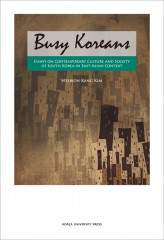Busy Koreans: Essays on Contemporary Culture and Society of South Korea in East Asian Context
ISBN-13: 978-89-7641- 858-6
Hardcover: 200 pages
Language: English
We are proud to announce the publication of Busy Koreans: Essays on Contemporary Culture and Society of South Korea in East Asian Context by Dr. Hyewon Kang Kim (Director of The Cultural Studies Centre of East Asia in Hong Kong). Dr. Hyewon Kang Kim is a noted Korean scholar for her extensive work on Cultural Studies.
A prior work by Dr. Hyewon Kang Kim, entitled Contemporary Korean Culture (Peking University Press), was selected as a ‘Phoenix Great Book’. Her objective and thorough analysis has been lauded for enhancing the status of Korean Culture above its previous focus on the Hallyu (Korean Wave) or perceptions of it as a mere imitation of Chinese culture. The book is the English edition of her Korean-language work To have Dim Sum for Jeomsim (Korea University Press), a winner of the 2013 Ministry of Culture, Sports, and Tourism’s list of ‘The year’s Excellent Books’ for its role in addressing important questions such as “What is Culture?” and “How does culture change with society?”
Busy Koreans, the first English publication on Korean culture and society written from an East Asian perspective, seeks to provide English-language readers with an opportunity to learn more about the topic from an East Asian perspective.
This book consists of five chapters. The first chapter, entitled The Ever-evolving Nature of Culture, is designed to explain the basic attributes of culture before discussing each cultural aspect in greater detail. The topics that will be discussed here are: how East Asian culture has been affected by Orientalism, how economic development has influenced cultural changes in South Korea and China, what secrets are behind the Korean Wave, why South Korean literature has been so serious, why golf has become a status symbol in South Korea, and a few more.
The second chapter, entitled The Ways of Thinking, covers East Asians’ beliefs. The topics that will be discussed in this chapter are: why South Koreans share a strong sense of group consciousness, how Confucian traditions have affected South Koreans, why Christianity has become so popular in South Korea and China, what myths South Koreans have, why South Koreans have an inferiority complex of a marginal state, and so on.
about author
Hyewon Kang Kim is the author of the Chinese book 《中韩文化谈Talk about Cultures of China and Korea》 published by Peking University Press. The book was selected for the recognized Phoenix Great Book List凤凰好书榜 in 2013, reviewed by Wen Yi Bao, China Publishing & Media Journal, and Dajianet, etc. Another of her recent publication is an award-winning Korean book 《딤섬으로 점심먹기To Have Dim Sum for Jeomsim》 published by Korea University Press, which was selected for The Year’s Excellent Books in the social science category by the Ministry of Culture, Sports and Tourism of the Korean Government in 2013.
She has published many articles on cultural phenomena and films, as well as more academic researches on Korean linguistics and language teaching. She also wrote a poetry book 《사랑할 사람The One to Love》 published by Kyungin Publishing in 2011. She regularly writes articles on liberal arts for the Korean newspaper Maeil Business Newspaper as an invited scholar.
Born and raised in South Korea, she graduated from Yonsei University with a major in French literature, and then studied Korean language and culture for her PhD from the graduate school of Kyung Hee University. After she moved to Hong Kong in 1997, she served as the founding director of the Korean studies programmes at City University of Hong Kong and The University of Hong Kong. Currently she is working for The Cultural Studies Centre of East Asia in Hong Kong as the director and senior research fellow.
